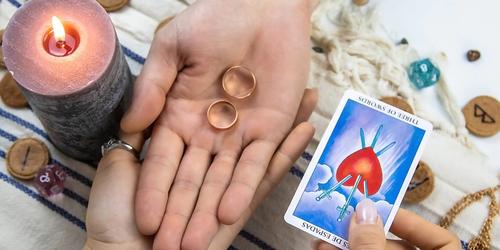
To pay for your reading on your telephone bill, simply call
Instantly message our featured psychics online via psychic messenger.
Click to start
Register now to start your reading online. PSYCHIC MESSENGER- Cheapest psychic service in the UK
- Our readers are available 24/7
- 100% confidential service
- In-depth, concise, personal readings
- Thousands of 5* reviews
Published 04/09/2022 by Joanne Jones
How to Deal With Rejection?
Rejection is an unfortunate reality that everyone faces at some point. Rejection can trigger emotions such as sadness, disappointment, and frustration, whether from a job application, a romantic interest, or a social group.
Despite the negative feelings associated with rejection, it can also be a learning experience to help individuals grow and become better versions of themselves.
Learning how to deal with rejection is not easy, but it is something that we all have to go through in one way or another. By acknowledging and accepting rejection, reframing it as an opportunity to grow, and maintaining a positive mindset and perseverance, individuals can learn from their experiences and become stronger in the face of adversity.
Why Is Rejection Painful?
Rejection is a painful experience that can leave deep scars on one's psyche. Science has shown that the area of the brain responsible for physical pain also processes the pain associated with emotional rejection, which sheds light on why it hurts to be rejected.
The emotional pain of rejection causes the brain to release stress hormones. Through the various stages of rejection, these hormones can cause increased heart rate, blood pressure, and inflammation, also causing various mental health conditions.
Rejection can hurt a person's self-esteem. People may feel unworthy, unlovable, and even ashamed when rejected. These negative, painful feelings can bring about a cycle of self-doubt and anxiety, eroding one's confidence and sense of self, which is why it is so important to learn how to handle rejection properly.
The feelings of rejection can trigger a fear of further rejection, causing a person to avoid situations that could lead to rejection. This fear can hinder personal growth and prevent one from experiencing new opportunities and relationships.
What Are the Different Forms of Rejection?
We can experience rejection in many ways, and it can be experienced at varying degrees. There are many reasons for rejection; some of the more common forms of rejection include:
- Being ignored or avoided.
- Being told outright that you are not wanted or desired.
- Being made to feel like you are not good enough.
- Being treated differently than others who are accepted.
- Being left out or excluded from activities or events.
- Not being chosen for a certain opportunity or position.
- Being passed over for a promotion or raise.
- Being fired from a job.
- Having your ideas or suggestions rejected.
- Being rejected by your family or friends.
- Being rejected romantically.
Romantic Rejection
One of the most common and well-known forms of rejection is romantic rejection. This kind of rejection occurs when someone expresses their romantic interest in another person, but that interest is not reciprocated. The response to rejection of this kind can be painful and emotionally challenging, leaving the person feeling hurt, embarrassed, and humiliated.
Romantic rejection can take on many different forms. Sometimes, it is outright and direct, with the person being very clear that they are not interested in pursuing a personal relationship. Other times, it can be more ambiguous or indirect, leaving the other person unsure of where they stand and whether they should continue pursuing the relationship.
Rejection in intimate relationships can be a difficult emotional reaction to navigate. The sting of rejection causes feelings of inadequacy, low self-esteem, and even depression, which can also lead to mental health issues and negative coping mechanisms like substance abuse or self-harm.
It can stir up confusing emotions if you want to stay friends with an ex after rejection. They may still have lingering feelings for their ex-partner, which can lead to feelings of jealousy and resentment when their ex moves on to a future relationship.
Job Rejection
Regarding career rejection, the emotional impact on an individual can be substantial. One of the most challenging aspects of job rejection is the uncertainty that accompanies it.
Waiting for a response from a potential employer can be a stressful and anxiety-provoking process. The anticipation of a possible job offer can create a sense of hope and excitement, while the disappointment of receiving a rejection can be crushing. In some cases, individuals may experience a high sensitivity to rejection and feel a sense of shame or inadequacy, leading to feelings of self-doubt and low self-esteem.
According to statistics, job rejection is undoubtedly a widely experienced occurrence during the job search process. Many hiring managers receive hundreds, if not thousands, of applications for a single position, which means that most qualified candidates do not even make it to the interview.
It's only natural for a job seeker to feel disappointed or upset after not being selected for a position, but this is not an indicator of their personal worth or professional potential. Read about the best career for your star sign.
Family Rejection
Family rejection is one of the most prevalent and devastating forms of rejection experienced by individuals. It occurs when a person's family members reject them based on their beliefs, sexual orientation, lifestyle choices, or physical appearance. In some cases, the reasons for being rejected by family members can be linked to divorce, remarriage, or abandonment. The effects of this type of family rejection can be long-lasting and manifest in various ways in the affected person's life.
Studies have shown that a lack of parental acceptance or support can negatively impact an individual's self-esteem and mental health, leading to depression, anxiety, and a host of other emotional issues.
When family members reject a person, they often feel alienated and disconnected from their roots, leading to a loss of identity.
Social Rejection
Social rejection can exacerbate unpleasant feelings of loneliness and isolation, further damaging their mental health and leading to social withdrawal. Many factors contribute to social rejection, including personality traits, social skills, and cultural norms. Individuals who are shy or introverted may be perceived as less friendly or approachable., leading to fewer opportunities for growth.
People who lack social skills, such as the ability to read social cues or engage in small talk, may struggle to form connections with others, leading to social rejection.
Culture is an integral aspect of our social makeup that influences our behaviour, thoughts, and beliefs. It plays a critical role in shaping our understanding of what is acceptable conduct and what is not. The expectations and norms set by our cultural background can be both a source of comfort and a source of exclusion.
Culture can significantly impact social rejection. Social norms and expectations may lead to ostracism, bullying, and peer pressure in schools and workplaces. Individuals must understand that their uniqueness and diversity should be celebrated and not belittled. We can build more diverse and inclusive cultures that promote social acceptance by acknowledging and valuing these differences.
How to Deal With Rejection?
The best way how to deal with rejection is to face it head-on. Try not to take things personally, and know that you are still a person of great value. The form of rejection that people fear most involves love—whether it is making the first move, proposing, or expressing your interest in someone.
Those rejected after making their feelings known will immediately assume something is wrong with them; the truth is, not everybody matches up as a potential suitor. You can't be everybody's soul mate.
How do you deal with rejection? Well, first of all, you must accept that it is a part of life and that you can do nothing to avoid it. What you can do is learn how to deal with rejection healthily.
1. Do Not Take It Personally
The first and most important thing to remember is that rejection is not personal. Just because someone does not want to be with you or work with you does not mean something is wrong with you. Whatever the reasons, learning how to cope with rejection can be an opportunity to reflect on your strengths and weaknesses and make improvements where necessary.
It can be easy to fall into a negative thought pattern when we experience rejection, making it difficult to move forward and continue pursuing our goals. Keeping a bright, positive attitude and focusing on our best strengths and accomplishments can maintain our motivation and keep striving towards success.
2. Talk With Someone
One of the best ways to cope with it is to talk with someone who can offer you genuine support, whether this is a close friend, a therapist, or even a live psychic reader; having someone to share your feelings with can make a significant difference in your emotional recovery.
Talking with a supportive person can help you process what happened and gain perspective. They can offer you helpful advice and valuable insight or share similar experiences of their own that can give you hope and motivation to move forward. They can also provide you with a safe space to express your emotions and validate your feelings.
3. Treat Yourself With Compassion
Self-compassion involves treating ourselves with kindness, care, and understanding. It is about recognising that we are all flawed humans who make mistakes and experience failure.
Rather than beating ourselves up or engaging in negative self-talk after a rejection, self-compassion involves being kind to ourselves and treating ourselves with the same level of care that we would give to a friend who was going through a challenging experience.
4. Stay Healthy
Exercise is a great way to promote physical and mental health. When we exercise, our brain releases endorphins that can improve our mood and reduce stress. Regular exercise can be a great confidence builder, which is one of the best ways how to cope with rejection healthily.
5. Do Not Allow Rejection to Define You
One way how to deal with rejection is to focus on the facts of the situation rather than our emotional response. It can be helpful to analyse the situation objectively, looking at the reasons for the rejection and considering how we could improve our approach next time. Taking a rational and constructive approach can turn rejection into a learning experience rather than a blow to our self-esteem.
6. Learn From the Experience and Move On
If you want to know how to cope with rejection, start by evaluating the situation objectively and try to understand the reason for the rejection. Was it a lack of qualifications or experience? Was the timing not right? Was the other person simply not interested?
By understanding the reasons for your feelings, you can gain insight into what you may need to work on or how you can approach similar situations differently in the future. Then, you can learn from the experience and move on.
How Do You Treat Someone Who Has Rejected You?
Knowing how you handle rejection can determine your emotional health and the future of your relationship with the person who rejected you. It is essential to recognise that not everyone may reciprocate our feelings, which is okay. While rejection may hurt initially, it is not the end of the world.
Giving yourself time to grieve and process the situation you may not have been expecting is essential. Allow yourself to acknowledge and channel your emotions positively, such as seeking support from family, doing things that make you happy, and practising self-care.
Avoid self-deprecating or vengeful behaviours, as they may only prolong your healing process and create negative energy.
It is also essential to respect the other person's decisions and boundaries. Do not pressure or guilt-trip them into changing their mind, as this may cause them to distance themselves further from you. Instead, take the high road and gracefully accept their decision even if they have been a long-term partner.
Be mature and know how to handle rejection with dignity, which may make the other person respect you even more.
Cheap Psychic Readings
Seeking cheap psychic readings from professional psychic readers can provide a much-needed support system to cope with complex emotions when having to learn how to cope with rejection.
Unlike traditional therapy, cheap psychic readings offer a unique perspective that combines spiritual and intuitive guidance as well as psychological support. Through their heightened psychic abilities, these readers can give insight into the underlying causes of your rejection and help you learn how to handle rejection and process your emotions more positively.
Professional psychic readers can pass on their wealth of experience and knowledge when learning how to handle rejection. They can offer step-by-step advice on how to handle rejection and the complicated feelings that come with these situations.
Experienced phone psychics can help you find your strengths and weaknesses, allowing you to build your self-esteem and confidence. Their empathetic nature lets them offer guidance and reassurance throughout the process, leading you to the best possible solutions.
Cheap psychic readings can also help you develop a more positive outlook on life and provide emotional support. They can teach you how to deal with your feelings by letting go of negative thoughts and self-doubt and combat the overall fear of rejection so you can start manifesting positive and constructive energies in your life.
FAQs
Should I Stay Friends With Someone Who Has Rejected Me?
Staying friends with an ex in a platonic without harbouring any residual feelings of romantic attraction can be very challenging. If you find that being around them or interacting with them triggers any romantic or emotional responses, it may be best to distance yourself from them for your emotional well-being.
It would be best to examine your motivation to remain friends with this person. Are you genuinely interested in maintaining a positive relationship with them, or do you hope their rejection will eventually change? If the latter is true, being honest and letting go of unrealistic expectations is crucial.
Should I Avoid Someone Who Has Rejected Me?
It depends on the circumstances surrounding the rejection and the individual's feelings and boundaries.
If the rejection was handled politely and respectfully, it may be possible to maintain a friendly acquaintance with the person without feeling uncomfortable or awkward. On the other hand, if the rejection is harsh or insensitive, it may be best to limit or completely cut off contact to protect one's emotional well-being.
How Long Does It Take to Get Over Rejection?
If a person has experienced different types of rejection multiple times, it may take them longer to bounce back and feel confident again. How long it takes to get over rejection also depends on the coping mechanisms and support systems that an individual has in place. Those with a strong support system consisting of family and friends will likely recover from rejection quickly as they can receive emotional support and advice.
Why Does Romantic Rejection Hurt So Much?
Rejection in a romantic relationship can be so painful that it may cause us to question our self-worth. When rejected, it can feel like a personal attack against us, and we may wonder what we did wrong or what is wrong with us. These feelings can be particularly strong if we have low self-esteem or have experienced past rejection.
Rejection from a romantic partner may also trigger feelings of grief. When we invest time and energy into a relationship, it becomes a part of our identity and future plans. When the relationship is over, it can feel like a loss and cause us to grieve and feel heartbreak.
How to Contact a Trusted Psychic?
Trusted Psychics' live psychic readers can also be contacted through phone calls, Live Messenger chat, and social media platforms. This allows seekers to connect with their trusted psychic in a way that suits them best. Those who prefer a more traditional and personal experience may choose to speak with their live psychic readers over the phone, while those who prefer a more informal approach may opt for an online Live Messenger chat.
Trusted Psychics' readers are there to provide compassionate and nonjudgmental support. They understand how to deal with rejection and how difficult it can be to navigate the emotions that come with rejection, and they are committed to helping seekers find clarity, peace, and happiness.
Trusted Psychics' readers come from various walks of life and have a vast range of expertise. Some specialise in love and relationships and how to handle rejection, while others focus on career paths and finance.
No matter what area of life you are struggling with, there is a trusted psychic who can provide a cheap psychic reading that can help.
Contact Trusted Psychics today. We look forward to your call.
How To Contact A Trusted Psychic
Phone a live Psychic 24 hours a day
View all our live phone psychic and tarot readers online.
View All Live readersMessage a live Psychic 24 hours a day:
View all our live messenger psychic and tarot readers online.
launch messengerRecent Articles From the Trusted Psychics Blog

Why Choose a Psychic Love Reading?
Why choose a psychic love reading? They offer more than just yes/no responses; a gifted love psychic can interpret your partner’s feelings and his intentions.

The Power of Love Readings Video
Feeling lost in love? This video breaks down what a love psychic reading really is, how it works, and why so many people turn to psychics for love issues.

How to Get Your Relationship Back on Track
Learn how to get your relationship back on track with Trusted Psychics. Our love psychics are professionals in all areas of complex love & relationship issues.

Can Psychics Predict Love? Video
Are you ready to discover what the future holds for your love life? In this video, we discover if psychics can predict love & see hidden, concise love messages.

Best Psychic Love Readings
Discover our professional guide on the Best Psychic Love Readings in the UK. A psychic love reading can help you find direction and clarity in your love life.

The Power of Love Readings
Discover the power of Love Readings for your love life! A love psychic reading delivers targeted guidance to help you understand & navigate your romantic life.

